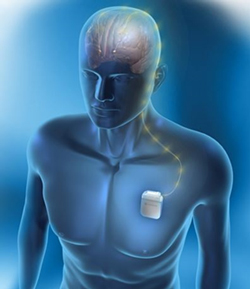Consumers and health professionals are advised that Medtronic Australasia, in consultation with the TGA, has issued a hazard alert regarding its neurostimulation devices used for deep brain stimulation therapies.

A neurostimulation device being
used for deep brain stimulation
The hazard alert notifies health professionals of a range of additional warnings regarding adverse events being added to the Instructions for Use (IFU) as part of a recall for product correction.
Deep brain stimulation devices are implantable, programmable medical devices that deliver electrical stimulation to the patient's brain. Deep brain stimulation devices are used to treat the symptoms associated with movement disorders, epilepsy and Parkinson's disease, as well as other neurological conditions.
As a result of monitoring of reported adverse events, clinical trials and published literature, Medtronic Australasia is updating the IFU to clarify potential risks that have been associated with these devices. Further details regarding the changes are contained in the 'Information for surgeons and neurologists' section below.
The names and model numbers of devices affected by the hazard alert are:
- Activa PC - 37601
- Activa SC - 37603
- Activa RC - 37612
- Kinetra - 7428
- Soletra - 7426
Information for consumers
Medtronic has written to health professionals who have implanted neurostimulator models affected by the hazard alert, or are managing patients who have these devices, providing further information.
These products are not being removed from the market.
Apart from details regarding a range of additional reported adverse events, two warnings have been added to the IFU regarding deep brain stimulation when it is used to treat dystonia and epilepsy.
Carers and patients undergoing deep brain stimulation for these conditions are advised to seek advice from a health professional if they notice any worsening of symptoms.
Carers and patients are also advised to ensure they know how to use the patient programmer in case the neurostimulator is accidentally turned off.
Further details of the updates to the IFU can be found in the 'Information for surgeons and neurologists' section below.
Information for health professionals
If you are treating a patient who has a neurostimulation device used for deep brain stimulation therapy, and they have any questions or concerns about these issues, refer them to their managing surgeon or neurologist.
Further details of the updates to the IFU can be found in the 'Information for surgeons and neurologists' section below.
Information for surgeons and neurologists
Surgeons and neurologists are advised to be alert to the updates to the IFU.
Additional warnings being added to the IFU:
- Deep brain stimulation therapy for dystonia:
- Status dystonicus - Severe, life-threatening dystonia symptoms, including status dystonicus (also known as dystonic crisis or dystonic storm), during ongoing or loss of deep brain stimulation therapy may result in respiratory compromise and rhabdomyolysis. In rare cases, rhabdomyolysis may progress to multi-organ failure and death.
- Monitor patients receiving deep brain stimulation therapy for these symptoms. Emphasise the importance of contacting the patient's physician if they experience increased severity of symptoms.
- Deep brain stimulation therapy for epilepsy:
- Return of symptoms - Cessation or reduction of stimulation may potentially lead to an increase in seizure frequency or severity. Symptoms may return with an intensity greater than was experienced prior to system implant, including the potential for status epilepticus. Emphasise the importance of contacting the patient's physician if they experience worsening of seizure frequency or severity.
It is also important that the patient or caregiver knows how to use the patient programmer in case the neurostimulator is accidentally turned off.
Additional adverse events being added to the IFU for all indications of deep brain stimulation therapy:
- meningitis, encephalitis or brain abscess resulting from infection involving the brain and/or central nervous system
- focal oedema localised to the area around the lead
- immediate or delayed intracranial haemorrhage or cerebral infarction which could be symptomatic, or which could result in temporary or permanent neurological injury or death
- aseptic intraparenchymal cyst formation around the distal lead tip.
If you have any questions or concerns regarding this issue, contact Medtronic Australasia customer service on 1800 668 670.
Reporting problems
Consumers and health professionals are encouraged to report problems with medical devices. Your report will contribute to the TGA's monitoring of these products. For more information see the TGA Incident Reporting and Investigation Scheme (IRIS).
The TGA cannot give advice about an individual's medical condition. You are strongly encouraged to talk with a health professional if you are concerned about a possible adverse event associated with a medical device.

